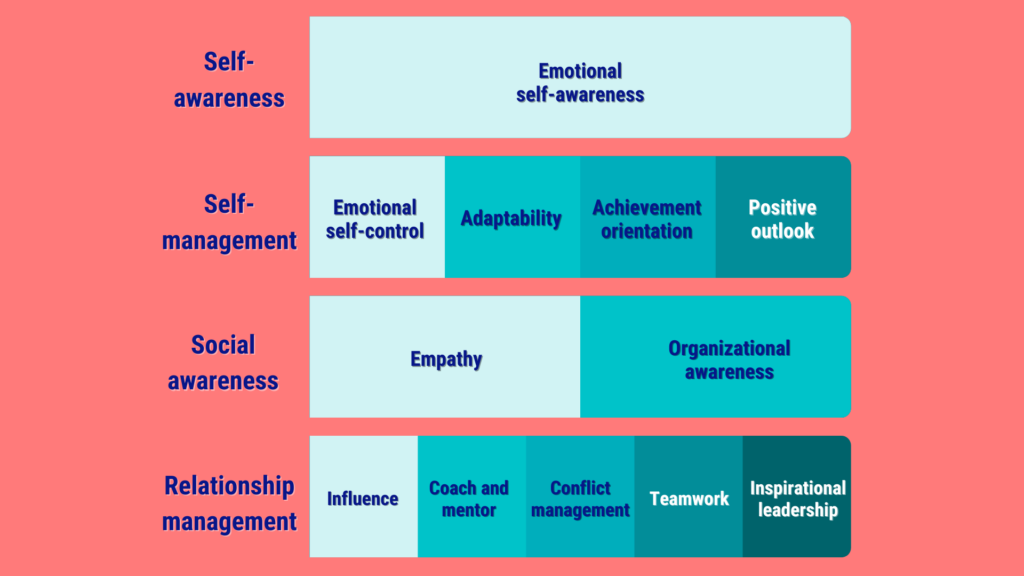While some business owners naturally lean into the relational side of their business, others are very transactional. Their focus is on getting things done and they constantly have their nose to the grindstone. As they’re moving forward, there may be resistance and hurt feelings along the way that don’t foster loyalty and trust from their team, customers, or vendors.
How you show up as a leader matters. If you focus only on your to-do list, your investment is being made in places that spin the plates. Your role is more global than that. While business acumen is critical for success, emotional intelligence (EQ) skills can tip the scale for you from scratching out a living as a small business owner to thriving as you grow your business.
What is Emotional Intelligence?
Emotional Intelligence impacts all of your relationships. For small business owners, EQ relates to the “soft skills” side of business. It’s so much more than being nice, which is a common misconception about emotional intelligence. It’s the way we understand ourselves and how we deal with our emotions while leading, and it breaks down into four components.
- Self-awareness. You need to know and recognize your emotions. That’s a lot harder than it sounds when you consider that we’re generally not good at understanding the many emotions we experience daily. According to research by Brené Brown, in which her team surveyed more than 7,000 people over five years, people can only identify about 3 emotions they experience. Understanding your own emotions will require some serious introspection and learning about yourself. And I would argue self-awareness goes well beyond emotional recognition. It also helps you understand your strengths and energizers and the areas where you’re most challenged.
- Self-management. Once you understand your emotions, you can better manage them and bring a more positive outlook to your team. What you bring to the business is good, and what the team brings together is even better. Sometimes, you’ll have to give feedback to your team members that is difficult for them to hear. Once again, nice doesn’t always work. It’s about being better equipped to deliver constructive feedback in a clear and kind way.
- Social Awareness. It’s your role as the business owner to think about how the organization is functioning as a whole. Empathy is critical to ensure each member of your team feels heard and appreciated, even when things don’t necessarily go the way they want. Social awareness will help you keep everybody engaged in making the team successful.
- Relationship Management. When you have a relationship of trust with your team members, you’re in a better position to coach and mentor them. You’ll also be able to resolve conflict more effectively, whether the outcome is finding the middle ground or stating a solution based on the reality of the situation and the parameters of the business. Inspirational leadership is always having the why in front of you and being able to help everyone on the team understand their valuable role in what the business is trying to accomplish.

Emotional Intelligence shows us that our role as small business owners goes beyond accomplishing tasks. It’s also engaging members of our team so they understand that their contribution is an important part of our business.
How Do You Improve Your Emotional Intelligence?
Emotional Intelligence is a learnable set of skills if you’re willing to put in the work. It will likely feel overwhelming if you’re a very transactional leader. I have a few tips to help you start small and set you on a path toward improving your EQ and your business.
- Find ways to become more self-aware. One obvious way to become more self-aware is through coaching, yet I have a really simple step you can take right now. Go get my free energizer checklist. Knowing your energizers is part of self-awareness, as well as recognizing your emotions and the places where they get out of control. If you know that being in a certain type of situation tips you over the edge, then you can figure out a way to choose a different path or regulate your emotions, which is part of the self-management component of emotional intelligence.
- Develop mindfulness and stay grounded. Find a simple behavior that will keep you aware of being in your body in stressful situations. For me, it’s connecting my fingertips. If I feel my emotions starting to run away during a conversation, I push harder against my fingertips. Being in that space where you are in your body in such a simple way can help you to stay grounded and be present in the moment. You can acknowledge that the other person has a point of view. It's different from yours. Can you listen and be curious in the moment? My virtual assistant, Ashley, shared her own method she learned from her parents. They would pause a difficult conversation until they were emotionally prepared for it. She saw it work for her family growing up, and she does it now. When she feels like she needs to prepare for a particular conversation, she’ll take ten minutes to make sure her physical needs are met and to regulate her emotions before starting it.
- Know the intrinsic reason why for what your business is doing. Everything you are doing relates to your why. Everything ties back to that intrinsic motivation of your why. If you can bring your team into the why and keep it ever in front of you and in front of your team, they will want the same things as you. The motivation will be there and it will drive your bottom line.
The Inflection Point Hub
I’ve partnered with Jeff Heyer-Jones, president of SparkEvolve, to create a peer advisory community focused on people in the growth stage of their business. That’s our sweet spot. We deliver a unique, robust package as a visionary and an integrator, as a coach and a consultant. We’re leveraging our cross-generational perspectives and extensive work with small business owners to bring our members exactly what they need to grow themselves and their businesses. Plus we bring in additional experts who understand what you need to be doing in your business at the stage it is at today.
We all need to have other people come alongside us and support us in the parts of the business where we are not strong. If you want to be part of a strong community of small business owners who are ready to take action to learn and grow together, The Inflection Point Hub™ is for you. Make this your year to have a defining moment, an inflection point, that significantly changes the trajectory and progress of your business. Apply today!

